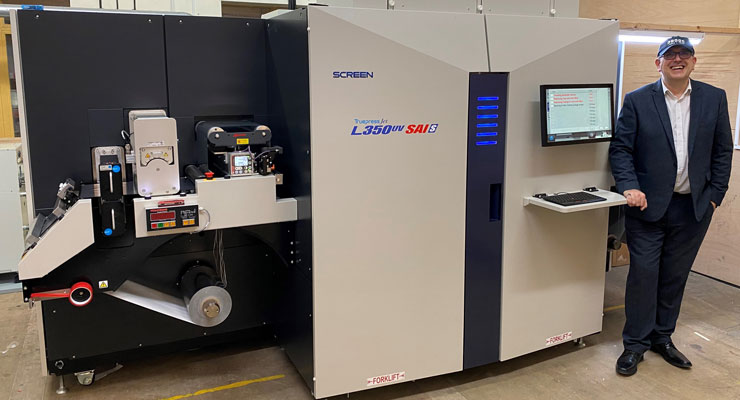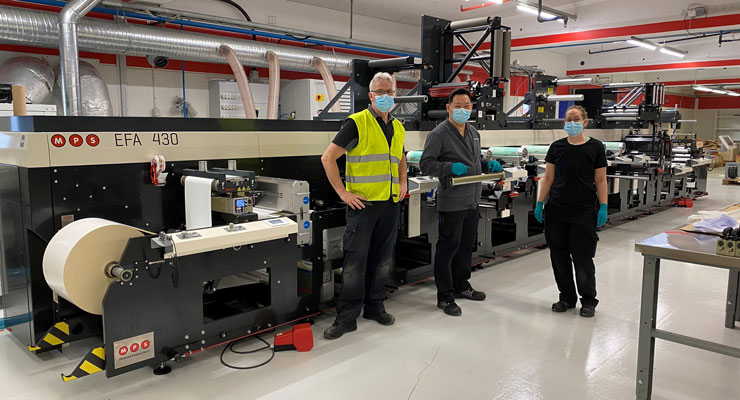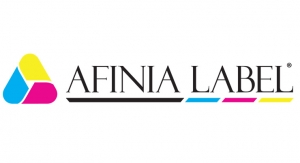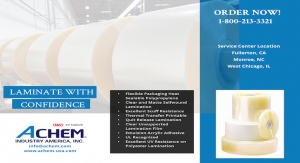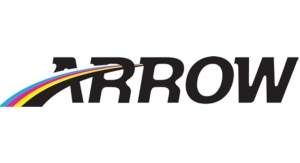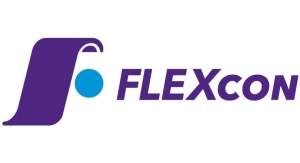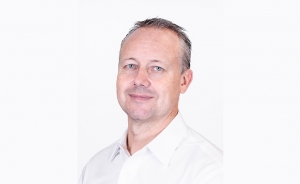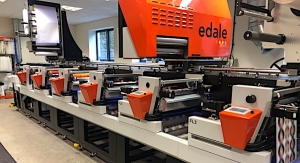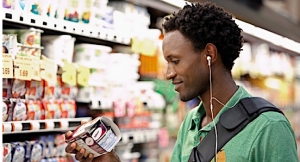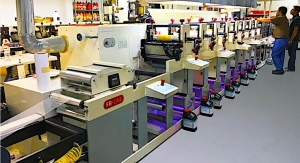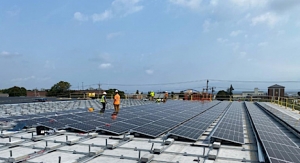John Penhallow04.13.21
The latest statistics from Europulp showed an unprecedented reduction in pulp stocked in Europe’s ports in January, down 23% compared with January 2020. This is partly attributable to the long-term decline in paper consumption and partly due to the COVID-19 pandemic, which can be conveniently blamed for anything.
Total production of pulp also fell, but by just 2.4%. Paper and packaging in Europe was also down, with the exception of packaging and label papers, which increased by 5% in 2020 over the previous year. Overall statistics for the British print industry showed a dismal picture, with sales sharply down in the fourth quarter 2020, and no improvement expected in the first months of 2021. This was blamed on “seasonal factors,” Brexit and, of course, COVID.
The sharp fall-off in goods traffic between England and France in January can be blamed entirely on Brexit. The good news is that there was no monumental tailback of trucks waiting to board the ferries. The bad news is that this was only because trade in and out of the UK is way down. (British exports were over 40% down.)
Labels: the exception which proves the rule
The latest figures from FINAT published in March of this year confirmed the good health of Europe’s label industry. The pandemic caused frequent shortages, and this led many brand owners to buy more from multiple-site label converters. However, on average, for label converters big and small, volumes were slightly up on 2019.
What’s more, the FINAT survey of 70 brand owners and packaging buyers shows that 73% expect that volumes purchased will increase in 2021. The shift toward digitally-printed labels continued in Europe, but curiously, fewer label buyers are interested in the sort of late-stage customization options offered by digital printing. There seems to be no convincing reason for this.
Screen’s Truepress is just one of the digital presses that is doing well. Links Labels in the UK has taken delivery of a 5-color Screen Truepress Jet SAI press, the first of its kind to be sold in Britain. This model, with its improved automatic color management, enables consistent 5-color printing at 60 m/m, according to Darren Dutton of Links Labels. The newly installed press is being used to print COVID test and other medical labels. Orders can now be delivered within 2-3 days instead of 5-7, according to Dutton.
Machinery – doing nicely, thank you
To everyone’s surprise, Europe’s machinery manufacturers are feeling bullish. In Germany and France in particular, growth is such that supply chains are coming under pressure. Manufacturing is increasingly emerging as the main driver of the Eurozone economy, according to Chris Williamson of IHS Markit, and the strong expansion of manufacturing is offsetting the weakness of many customer-facing sectors.
However, this renewed growth is creating its own difficulties, as the supply of raw materials and finished products is not sufficient to meet demand. Numerous delays in the shipment of goods and shortages of raw materials led to a near-record lengthening of suppliers' delivery times in February. As a result, prices for machinery are rising. A year ago, many of Europe’s label converters rushed to take out low-interest government-backed loans, as they battened down their hatches in preparation for a storm that never came. This could go toward explaining why many label converters are sitting on war chests of cash which, machinery and software manufacturers hope, will soon bring on a boom in investment.
This seems already to be true of the Netherlands, where narrow web press manufacturer MPS has recently opened a new 5,000 square-foot building “to extend production capacity, warehouse logistics, and secure space for future growth,” according to Anton Spierenburg, MPS supply chain and operations manager. A recent sale was to Swedish converter Eson Pac, who in January of this year took delivery of an MPS EFA 430 flexo press.
According to Pierre Åkesson of Eson Pac, “This fully automated 8-color press is a natural step for Eson Pac as we continue to focus on providing solutions for the pharma industry.”
Eco-friendly beer labels from Bavaria
Metalized labels are not always easy to recycle. Sappi, maker of label substrates, and ink and adhesive specialist ACTEGA Metal Print GmbH reckon they have the solution. Using Sappi’s semi-gloss “Labelcar MT” substrate and ACTEGA’s Eco-Leaf metalizing process, the craft beer brewery Unser Dorfbräu now uses labels that are not only recyclable but also much cheaper to produce than traditional foil-based labels.
Klaus Musselmann, co-owner of Unser Dorfbräu, recalls, “We were thrilled with the idea. We had already thought about finishing our beer bottle labels with metallic effects, but due to the high costs for the required hot foil production, we had rejected the idea.”
Since in Bavaria people love ecology almost as much as they love beer, the idea could spread like a foaming wave.
Eco-liner from Mondi, or linerless from Raflatac
From its European head office in Vienna, Mondi has been researching into ways to make a better, greener liner material. It looks as if its EverLiner Labelite could be a winner. At just 47 g/m2, it is lighter than standard glassine liners, and according to the manufacturer has the same mechanical properties. But the clinching argument is that it contains 70% recycled materials. Andrea Lackner, Mondi’s R&D director, reports that a beta test run with a European converter showed a “significant” reduction in carbon footprint.
Not far to the north of Vienna, but in Poland, UPM Raflatac has a big project under way to increase its production of direct thermal (DT) linerless film. By the end of this year, the UPM mill at Nowa Wieś will boost its production capacity for DT films by around one billion square feet per year. Demand for DT film is rising by 15% per year, says UPM’s executive VP Antti Jääskeläinen. “This extra capacity will help brand owners to meet their carbon footprint objectives,” says Jääskeläine.
…and 3D digital inks from Italy
With digital label printing, it is not easy to get the kind of 3D effect so easy to do with screen printing. But Italy’s Cartes reckons it has the solution with its Jet D-Screen technology.
According to Cartes, this allows the converter to create multi-layer effects such as spot coating, complex tactile raised effects and braille printing, as well as detailed foil and metallic doming. No pre-treatment of the substrate is required, and the whole thing is on offer at “an extremely competitive cost.”
Pack it or smoke it?
All sorts of curious things make up packaging these days. The UK-based Magical Mushroom Company (yes, really) says it has developed an impeccably green substitute for polystyrene packaging. The sustainable mushroom packaging (using US-patented technology) is composed of what the company calls MycoMaterials. These include mycelium, which is, wait for it, “the root-like structure of mushrooms” that the company combines with other organic materials, such as hemp, to produce its MycoComposite protective packaging.
The firm plans to open a second UK plant later this year, allowing for an increase in total production to more than three million units per year. This will be followed by the opening of plants in Bulgaria and Italy, which, combined, will provide production capacity for the EU of more than six million units annually. A third European plant will open in Germany in 2022.
A packaging product made from mushrooms and hemp is likely to attract millennials for all the wrong reasons. However, the inventors assure us it’s non-addictive, so that’s all right.
Total production of pulp also fell, but by just 2.4%. Paper and packaging in Europe was also down, with the exception of packaging and label papers, which increased by 5% in 2020 over the previous year. Overall statistics for the British print industry showed a dismal picture, with sales sharply down in the fourth quarter 2020, and no improvement expected in the first months of 2021. This was blamed on “seasonal factors,” Brexit and, of course, COVID.
The sharp fall-off in goods traffic between England and France in January can be blamed entirely on Brexit. The good news is that there was no monumental tailback of trucks waiting to board the ferries. The bad news is that this was only because trade in and out of the UK is way down. (British exports were over 40% down.)
Labels: the exception which proves the rule
The latest figures from FINAT published in March of this year confirmed the good health of Europe’s label industry. The pandemic caused frequent shortages, and this led many brand owners to buy more from multiple-site label converters. However, on average, for label converters big and small, volumes were slightly up on 2019.
What’s more, the FINAT survey of 70 brand owners and packaging buyers shows that 73% expect that volumes purchased will increase in 2021. The shift toward digitally-printed labels continued in Europe, but curiously, fewer label buyers are interested in the sort of late-stage customization options offered by digital printing. There seems to be no convincing reason for this.
Screen’s Truepress is just one of the digital presses that is doing well. Links Labels in the UK has taken delivery of a 5-color Screen Truepress Jet SAI press, the first of its kind to be sold in Britain. This model, with its improved automatic color management, enables consistent 5-color printing at 60 m/m, according to Darren Dutton of Links Labels. The newly installed press is being used to print COVID test and other medical labels. Orders can now be delivered within 2-3 days instead of 5-7, according to Dutton.
Machinery – doing nicely, thank you
To everyone’s surprise, Europe’s machinery manufacturers are feeling bullish. In Germany and France in particular, growth is such that supply chains are coming under pressure. Manufacturing is increasingly emerging as the main driver of the Eurozone economy, according to Chris Williamson of IHS Markit, and the strong expansion of manufacturing is offsetting the weakness of many customer-facing sectors.
However, this renewed growth is creating its own difficulties, as the supply of raw materials and finished products is not sufficient to meet demand. Numerous delays in the shipment of goods and shortages of raw materials led to a near-record lengthening of suppliers' delivery times in February. As a result, prices for machinery are rising. A year ago, many of Europe’s label converters rushed to take out low-interest government-backed loans, as they battened down their hatches in preparation for a storm that never came. This could go toward explaining why many label converters are sitting on war chests of cash which, machinery and software manufacturers hope, will soon bring on a boom in investment.
This seems already to be true of the Netherlands, where narrow web press manufacturer MPS has recently opened a new 5,000 square-foot building “to extend production capacity, warehouse logistics, and secure space for future growth,” according to Anton Spierenburg, MPS supply chain and operations manager. A recent sale was to Swedish converter Eson Pac, who in January of this year took delivery of an MPS EFA 430 flexo press.
According to Pierre Åkesson of Eson Pac, “This fully automated 8-color press is a natural step for Eson Pac as we continue to focus on providing solutions for the pharma industry.”
Eco-friendly beer labels from Bavaria
Metalized labels are not always easy to recycle. Sappi, maker of label substrates, and ink and adhesive specialist ACTEGA Metal Print GmbH reckon they have the solution. Using Sappi’s semi-gloss “Labelcar MT” substrate and ACTEGA’s Eco-Leaf metalizing process, the craft beer brewery Unser Dorfbräu now uses labels that are not only recyclable but also much cheaper to produce than traditional foil-based labels.
Klaus Musselmann, co-owner of Unser Dorfbräu, recalls, “We were thrilled with the idea. We had already thought about finishing our beer bottle labels with metallic effects, but due to the high costs for the required hot foil production, we had rejected the idea.”
Since in Bavaria people love ecology almost as much as they love beer, the idea could spread like a foaming wave.
Eco-liner from Mondi, or linerless from Raflatac
From its European head office in Vienna, Mondi has been researching into ways to make a better, greener liner material. It looks as if its EverLiner Labelite could be a winner. At just 47 g/m2, it is lighter than standard glassine liners, and according to the manufacturer has the same mechanical properties. But the clinching argument is that it contains 70% recycled materials. Andrea Lackner, Mondi’s R&D director, reports that a beta test run with a European converter showed a “significant” reduction in carbon footprint.
Not far to the north of Vienna, but in Poland, UPM Raflatac has a big project under way to increase its production of direct thermal (DT) linerless film. By the end of this year, the UPM mill at Nowa Wieś will boost its production capacity for DT films by around one billion square feet per year. Demand for DT film is rising by 15% per year, says UPM’s executive VP Antti Jääskeläinen. “This extra capacity will help brand owners to meet their carbon footprint objectives,” says Jääskeläine.
…and 3D digital inks from Italy
With digital label printing, it is not easy to get the kind of 3D effect so easy to do with screen printing. But Italy’s Cartes reckons it has the solution with its Jet D-Screen technology.
According to Cartes, this allows the converter to create multi-layer effects such as spot coating, complex tactile raised effects and braille printing, as well as detailed foil and metallic doming. No pre-treatment of the substrate is required, and the whole thing is on offer at “an extremely competitive cost.”
Pack it or smoke it?
All sorts of curious things make up packaging these days. The UK-based Magical Mushroom Company (yes, really) says it has developed an impeccably green substitute for polystyrene packaging. The sustainable mushroom packaging (using US-patented technology) is composed of what the company calls MycoMaterials. These include mycelium, which is, wait for it, “the root-like structure of mushrooms” that the company combines with other organic materials, such as hemp, to produce its MycoComposite protective packaging.
The firm plans to open a second UK plant later this year, allowing for an increase in total production to more than three million units per year. This will be followed by the opening of plants in Bulgaria and Italy, which, combined, will provide production capacity for the EU of more than six million units annually. A third European plant will open in Germany in 2022.
A packaging product made from mushrooms and hemp is likely to attract millennials for all the wrong reasons. However, the inventors assure us it’s non-addictive, so that’s all right.

